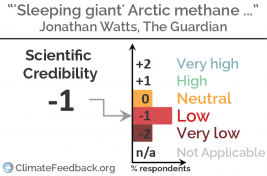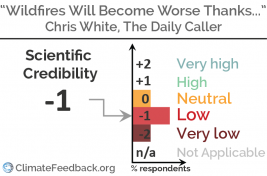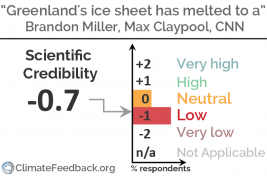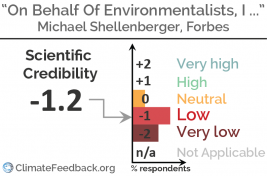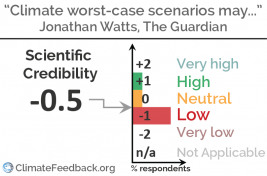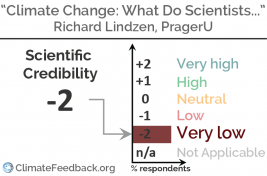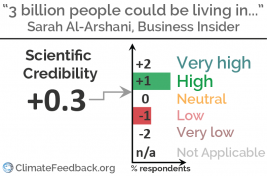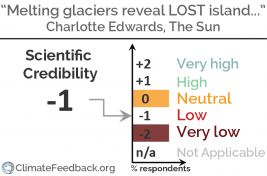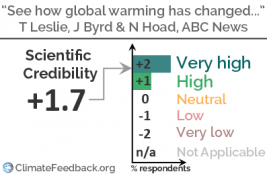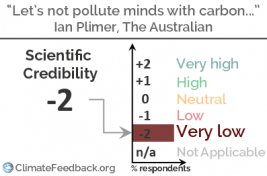Article Reviews
“Is this article consistent with the latest thinking and knowledge in science?”
“Would experts in this field endorse the main message of this article?”
These are the types of questions our “feedbacks” are designed to answer. If the feedback is positive, you can generally assume the information you’re reading is of high credibility. If it’s negative, however, you may want to read with extra care and attention — some of the information contained and conclusions reached are not consistent with science.[1]
Guardian article on Arctic methane emissions claiming “a new climate feedback loop may have been triggered” lacks important context
in The Guardian, by Jonathan Watts
"This article’s claim that methane deposits in the Arctic Ocean are starting to be released, awakening a “sleeping giant”, cannot be supported by the limited observational data. Besides, even if these newly found seeps are increasing, they are located too deep in the ocean to have a significant impact on the concentration of methane in the atmosphere."
— 30 Oct 2020
Article by The Daily Caller oversimplifies drivers of wildfires and downplays role of climate change
in The Daily Caller, by Chris White
"The causes of the increase in burned area in the western US in recent decades – and the record-setting fires of 2020 – are complex, driven by a mix of a changing climate, a 100-year legacy of overzealous fire suppression in forests adapted for frequent low-level fires, more people living in highly flammable wildland urban interface areas, and at times a counterproductive role of some environmental regulations. However, this article glosses over much of this complexity, presenting a simple but misleading narrative that land management rules enacted by the Clinton administration set the stage for the destructive fires we are experiencing today."
— 28 Sep 2020
Article by CNN exaggerates study’s implications for future Greenland ice loss with “point of no return” claim
in CNN, by Max Claypool and Brandon Miller
The article in CNN discusses findings from a study published August, 2020 that analyzes trends of ice discharge from the Greenland Ice Sheet over the past three decades[1]. Reports on this study were also published by Reuters and Phys.org, receiving over 200,000 interactions on Facebook across the three articles, according to CrowdTangle. Scientists who reviewed … Continued
— 20 Aug 2020
Article by Michael Shellenberger mixes accurate and inaccurate claims in support of a misleading and overly simplistic argumentation about climate change
in Forbes, by Michael Shellenberger
"Shellenberger’s article promoting his new book “Apocalypse Never” includes a mix of accurate, misleading, and patently false statements. While it is useful to push back against claims that climate change will lead to the end of the world or human extinction, to do so by inaccurately downplaying real climate risks is deeply problematic and counterproductive."
— 06 Jul 2020
Article in The Guardian misleads readers about sensitivity of climate models by narrowly focusing on single study
in The Guardian, by Jonathan Watts
"The article correctly reports that the most recent versions of some climate models estimate more warming for a given increase in CO2 concentrations. It is also correct in highlighting that how clouds are represented in these models is the likely reason for these higher estimates. However, it does not report all the science available on this topic and its claims are thus misleading."
— 18 Jun 2020
Video from PragerU makes several incorrect and misleading claims about climate change
in PragerU, by Richard Lindzen
This video discussing climate change was first published on PragerU’s website in April 2016 and recently posted on Facebook in May 2020. Scientists that evaluated the video found several claims about climate change to be incorrect and misleading to viewers.
— 23 May 2020
Article in Business Insider accurately describes results from a study estimating up to 3 billion people could live in much warmer temperatures by 2070
in Business Insider, by Sarah Al-Arshani
The article in Business Insider discusses findings from a study published May, 2020 that projected one to three billion people could live in much warmer climates by 2070, assuming migration is limited and greenhouse gas emissions remain high. The Business Insider article accurately describes the study’s projected changes in mean annual temperatures around the globe, however, the study does not describe these increased temperatures as “unbearable” or “unlivable,” as claimed in the article.
— 12 May 2020
Article in The Sun misrepresents Antarctic discovery and misplaces it on map
in The Sun, by Charlotte Edwards
This article in The Sun describes the chance discovery of a small island in Antarctica’s Pine Island Bay, which seems to have appeared in the last decade. But the article sensationally connects this with a recent record high temperature at a station elsewhere in Antarctica. While warming trends in the atmosphere and ocean may be relevant, a single weather record is not. It is not yet clear what is responsible for the island’s appearance.
— 10 Mar 2020
ABC article effectively illustrates important climate trends for Australian readers
in Australian Broadcasting Company, by Tim Leslie, Joshua Byrd, Nathan Hoad
"This article is exceptionally good in delivering accurate information in an engaging way. There are many useful statements made about the effects of climate change on extreme weather globally and in Australia and these have been backed up by links to relevant peer-reviewed literature."
— 11 Dec 2019
Ian Plimer op-ed in The Australian again presents long list of false claims about climate
in The Australian, by Ian Plimer
"This article is a mixture of misdirection, misleading claims, and outright falsehoods. The author attempts to paint a picture of current climate change as simply a continuation of natural changes that have occurred in the past. But this neglects the clear evidence that climate change over the last two centuries has been shown to be largely man-made, that it is much more rapid that anything we have seen in the last two thousand years if not longer, and that it is occurring in the context of a globe with more than 7 billion human inhabitants."
— 26 Nov 2019
[1] Note: These feedbacks do not constitute endorsements of the author’s political or economic ideology, rather they are assessments of the scientific foundations and reasoning of the argumentation contained within each article.

